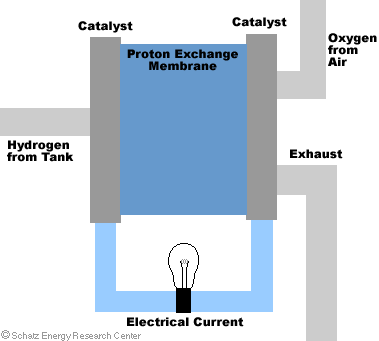 Energy
Energy Energy
Energyhttp://www.arsc.edu/pubs/factsheets/images/summerIce.0001.jpg
There are all kinds of ideas on how to produce energy without the traditional use of fossil fuels or
nuclear technology. The problem is, not all of them are viable for one reason or another. Some
things to think about when assessing a possible solution are:
1. Is it fairly simple?
2. Are the physics sound?
3. Has this technology been tested in a wide variety of settings?
4. And, is there a chance that the price to produce this energy, and any associated fuel, will ever be cost effective to the average consumer?
Fuel cells are a controversial technology that have been known for approximately twenty years.
They produce electricity directly through the separation of electrons from a hydrogen rich fuel
source, such as hydrocarbons rich in hydrogen, or pure hydrogen (H2). Below is a diagram of how
one type of fuel cell, a PEM (proton exchange membrane) works. The exact reason that electrons
flow accross the PEM is not known, and is an area of ongoing research. However, what is known
is that fuel cells offer an excellent source of electricity, and produce only oxygen and heat as by-
products.

http://www.humboldt.edu/%7Eserc/gifs/fuelcellani.gif
WIND POWER
Wind power is one of the oldest sources of energy. It was used to pump water, grind wheat, or anything else people needed large amounts of free energy for. Drawbacks of this energy source are:
1. Wind is not always present, so energy can be unreliable
2. High cost of production due to size and number of moving parts
3. Availability of winds of sufficient velocity
However, wind has again caught the attention of researchers because when used in conjunction with other energy sources, such as fuel cells, wind can be amore vioable energy source. One reason for this new look at wind:is that in the past, when gusts of wind occurred, and the demand was not high for electricity, the excess electricity was wasted. However, fuel cells have the property that they are reversible; input water and electricity, and you get hydrogen. This hydrogen can be stored for later use. And since hydrogen has a very high energy density, it is much more compact and efficient than a battery.